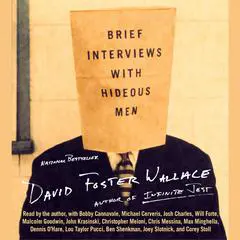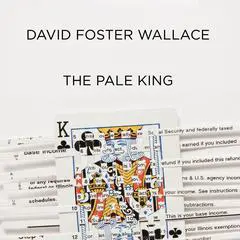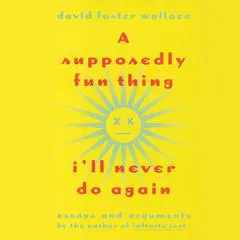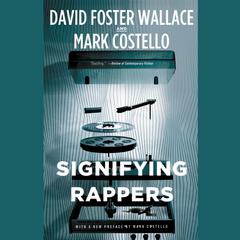 Play Audiobook Sample
Play Audiobook Sample
Oblivion: Stories Audiobook
 Play Audiobook Sample
Play Audiobook Sample
Quick Stats About this Audiobook
Total Audiobook Chapters:
Longest Chapter Length:
Shortest Chapter Length:
Average Chapter Length:
Audiobooks by this Author:
Publisher Description
In the stories that make up Oblivion, David Foster Wallace joins the rawest, most naked humanity with the infinite involutions of self-consciousness -- a combination that is dazzlingly, uniquely his.
These are worlds undreamt of by any other mind. Only David Foster Wallace could convey a father's desperate loneliness by way of his son's daydreaming through a teacher's homicidal breakdown (The Soul Is Not a Smithy). Or could explore the deepest and most hilarious aspects of creativity by delineating the office politics surrounding a magazine profile of an artist who produces miniature sculptures in an anatomically inconceivable way (The Suffering Channel). Or capture the ache of love's breakdown in the painfully polite apologies of a man who believes his wife is hallucinating the sound of his snoring (Oblivion).
Each of these stories is a complete world, as fully imagined as most entire novels, at once preposterously surreal and painfully immediate.
Download and start listening now!
"Based on some negative reviews I had read of this book, I started reading it expecting to be disappointed. Far from it; it actually ended up sucking me in, and I thought that it was an excellent read overall. Some stories are far stronger than others, of course. "Good Old Neon" and "The Soul is Not a Smithy" were my two favorites, the former because it seemed the most moving, personal story in the collection, and the latter simply because I thought it was a very unique approach to what could have been a more conventional story (this could be said of a great deal of Wallace's work, but I thought that his style of writing really lent itself well to "The Soul is Not a Smithy"'s plot and structure). The weakest stories in the collection, in my opinion, were "Mister Squishy," and "Philosophy and the Mirror of Nature." Wallace's trademark style of not providing real conclusions to his stories works for me a lot of the time, but in the case of these two pieces I found myself wishing that just once he could have given the reader a bit more to go on. I also loved the last, and longest, story in the collection, "The Suffering Channel". I am a huge fan of "Infinite Jest," and to me "The Suffering Channel" read like a miniaturized version of that novel. One review I read claimed it's the most conventional story of the lot, which in my opinion is a description similar to "the skinniest kid at fat camp" or something like that. The story is set in July 2001, and its characters all work in NYC's World Trade Center. As such, I feel that Wallace's habit of not wrapping up stories properly works particularly well in this case. He doesn't provide a real conclusion to the narrative, but in a way he doesn't need to; the reader knows that the majority of the characters are doomed, and this dramatic irony makes the story extremely morbid and yet also, ultimately more satisfying than a few of the others in the collection.Overall, I would recommend "Oblivion" to any David Foster Wallace fan, as well as anyone who wants to get into his work but doesn't feel like laboring through "Infinite Jest"."
— Daniel (5 out of 5 stars)
Quotes
-
“Wallace is a prose magician.”
— New York Times -
“The fun of watching his high-wire act—maintaining a style you’d never guess you’d want to exist—is topped by the pleasure of seeing him make it evocative…Wallace has dreamt up a new vocabulary for lives of quiet desperation…The firepower…is undeniable.”
— Entertainment Weekly -
“In the surreal landscapes of these eight stories, the quotidian is lit by the glare of nightmare, and characterized by narrators sinking into oblivion or pushed to the peripheries by insomnia, stress, manic depression, or attention deficit disorder…These stories are stunning.”
— Observer (London) -
“Stunning…Wallace is an astounding storyteller whose fiction reminds us why we learned to read in the first place.”
— San Francisco Chronicle -
“With almost cruelly tuned intensity, Wallace writes around his characters in the virtuoso style best set down in his epic novel Infinte Jest…Many of Oblivion’s reward come by way of Wallace’s sheer mastery of craft. His sentences crackle and swoon, patiently peeling back layers of artifice that cloak the Big Questions.”
— AV Club -
“A high-wire performance by the star of kinetically cerebral fiction…rife with shrewd metaphysical inquiries, eviscerating social critiques, and twisted humor.”
— Booklist -
“Perfectly illustrates Wallace’s genius for combining intellectual high seriousness and tomfoolery with compassionate insight into distinctively contemporary fears and neuroses. One of our best young writers just keeps getting better.”
— Kirkus Reviews
Awards
-
One of the 2004 New York Times Book Review 100 Notable Books for Fiction
Oblivion Listener Reviews
-
" If you read "Incarnations of Burnt Children" and don't cry, I really have no use for you. "
— Mary, 2/12/2014 -
" His short-stories are hard to read, but they're still great to read all the same. So far I like it -- we'll see if I end up loving it! =) "
— Eileen, 2/10/2014 -
" oh he is a wordy bastard and is a master of description. Not his best work, a bit of a slog "
— Linda, 2/9/2014 -
" I had like two paragraphs typed up and then I decided I didn't like them. Now then. This book is what fiction and hence art Should Do - attempt to understand what it is to be a person. I wish there would be more. "
— brain, 2/7/2014 -
" I couldn't get into it. I know he was brilliant, but he must be the king of long paragraphs. "
— William, 1/2/2014 -
" I clearly don't get the genius of David Foster Wallace's writing, though I wish I did! "
— Jessica, 1/2/2014 -
" Months after reading these stories, I'm still thinking about them. They're sticky, like a seemingly absurd dream that nevertheless asserts its reality in your mind, blending in with and sometimes dominating over episodes remembered from from waking life. "
— Marcie, 1/1/2014 -
" i don't know, dude, i just like your nonfiction better. "
— Stephanie, 12/25/2013 -
" Fun reading, makes me miss last summer's reading of Infinite Jest. "
— Timothy, 12/1/2013 -
" Some stories are better than others, but the book is worth buying for "Good Old Neon" alone, possibly the best short story I've read. "
— Chris, 11/24/2013 -
" Read this when it came out, read the first story when it appeared in McSweeney's under a pseudonym, thought he was losing it at the time, thought I'd re-read it now, not gonna do it now however "
— Lee, 11/12/2013 -
" dude knows all kinda words "
— Greg, 11/11/2013 -
" Intelligence, savage humor, and a few uncomfortable truths woven into eight mesmerizing stories of modern disillusionment. Difficult at times, but well worth the effort. Favorite stories: "Mister Squishy," "The Soul Is Not A Smithy," "Good Old Neon," and "The Suffering Channel." "
— Jason, 9/23/2013 -
" Can I still consider myself a DFW fan if I got so bored and bogged down in this book that I stopped reading it? "
— Chuck, 4/15/2013 -
" A bit headier and more involuted than Brief Interviews, but still extremely good. "
— Max, 7/31/2012
About David Foster Wallace
David Foster Wallace (1962–2008) was the New York Times bestselling author of Infinite Jest, The Broom of the System, and Girl with Curious Hair. His essays and stories have appeared in Harper’s, the New Yorker, Playboy, Paris Review, Conjunctions, Premiere, Tennis, the Missouri Review, and the Review of Contemporary Fiction. He received numerous awards, including the Whiting Award, the Lannan Award for Fiction, the QPB Joe Savago New Voices Award, and the O. Henry Award.
About Robert Petkoff
Robert Petkoff is an actor and audiobook narrator who has won a prestigious Audie Award and multiple AudioFile Earphones Awards and has been named an AudioFile Golden Voice. He has appeared on Chappelle’s Show, Law & Order, and Quantum Leap. His Broadway credits include Sir Robin in Spamalot, Perchik in Fiddler on the Roof, and Tateh in Ragtime.






































